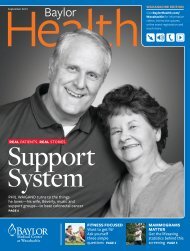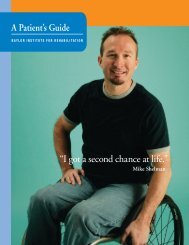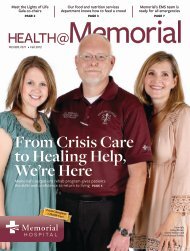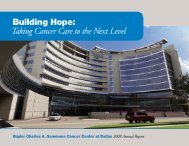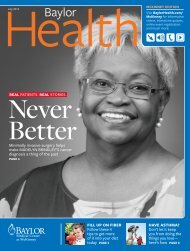Focused on the patient - Baylor Health Care System
Focused on the patient - Baylor Health Care System
Focused on the patient - Baylor Health Care System
Create successful ePaper yourself
Turn your PDF publications into a flip-book with our unique Google optimized e-Paper software.
36<str<strong>on</strong>g>Focused</str<strong>on</strong>g> <strong>on</strong> innovati<strong>on</strong>effects of interfer<strong>on</strong>, which means that <strong>patient</strong>s can work, travel, and enjoy normal activitieswhile undergoing treatment.In clinical trials, sorafenib and sunitinib caused tumor shrinkage in 70% to 80% of <strong>patient</strong>s.Also, research has shown that if <strong>on</strong>e of <strong>the</strong>se three drugs stops working in a <strong>patient</strong>, switchingto ano<strong>the</strong>r will produce <strong>the</strong> same positive effects.Dr. Thomas Huts<strong>on</strong>“Once you can achieve some degree of tumor shrinkage, <strong>the</strong> tumor becomes stable andw<strong>on</strong>’t grow any fur<strong>the</strong>r. That increases <strong>patient</strong>s’ survival time,” Dr. Huts<strong>on</strong> explained. Alreadysunitinib and temsirolimus have surpassed interfer<strong>on</strong> as <strong>the</strong> standard first-line treatment foradvanced kidney cancer.“We have a comprehensive renal-cell cancer program at <strong>Baylor</strong> Dallas with a variety of clinicaltrials evaluating new and exciting <strong>the</strong>rapies,” Dr. Huts<strong>on</strong> said. The focus now is <strong>on</strong> moreresearch to find out how to use all three of <strong>the</strong>se drugs to <strong>the</strong> best advantage.The goal is to save livesby detecting early stagecancer in this populati<strong>on</strong>of smokers so <strong>the</strong>y canget treatment.CellSearch: Breakthrough Cancer Screening for SmokersIn March 2007, <strong>the</strong> Dallas-based Mary Crowley Medical Research Center, in collaborati<strong>on</strong>with <strong>the</strong> <strong>Baylor</strong> Samm<strong>on</strong>s Lung Cancer Center, launched a study aimed at early detecti<strong>on</strong> oflung cancer in high-risk smokers. Neil Senzer, MD, is <strong>the</strong> principal investigator for this study.A high percentage of lung cancer deaths are caused by cigarette smoking, and <strong>the</strong> lateststatistics from <strong>the</strong> Centers for Disease C<strong>on</strong>trol and Preventi<strong>on</strong> show that 180,262 lung cancercases are diagnosed each year, and 157,630 of those result in death. Detecting this type ofcancer at an early stage may be possible through <strong>the</strong> use of a new technology designed todetect circulating tumor cells (CTCs) in <strong>the</strong> body. CTCs are cancer cells that have detachedfrom solid tumors and entered <strong>the</strong> bloodstream. This can begin <strong>the</strong> process of metastasis,<strong>the</strong> most life-threatening aspect of cancer.The CellSearch <strong>System</strong> can pinpoint a single cancerous cell am<strong>on</strong>g 40 billi<strong>on</strong> blood cells.To put that into perspective, a tumor <strong>the</strong> size of a grain of rice has about a milli<strong>on</strong> cells; apea-sized tumor has nearly a billi<strong>on</strong> cells. The study targets asymptomatic pers<strong>on</strong>s aged50 to 74 with a 40-pack-year history of smoking who are current smokers or who have quitsmoking within <strong>the</strong> past 10 years.The goal is to save lives by detecting early stage cancer in this populati<strong>on</strong> of smokers so<strong>the</strong>y can get treatment. The study may prove that this screening approach will prove to bean earlier detecti<strong>on</strong> step at a cost-effective rate for those who are at high-risk for lung cancer.O<strong>the</strong>r Lung Cancer ResearchThe CellSearch preventi<strong>on</strong> study is <strong>on</strong>ly <strong>on</strong>e example of <strong>Baylor</strong>’s lung cancer–relatedresearch. The <strong>Baylor</strong> Samm<strong>on</strong>s Cancer Center participates in 10 to 15 lung cancertreatment trials at any given time. “We are always looking for different combinati<strong>on</strong>s of









